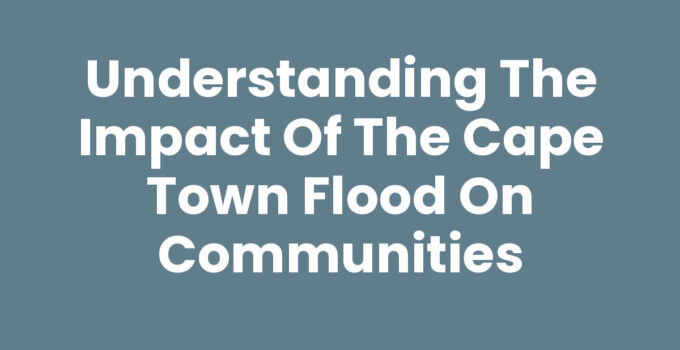In recent years, Cape Town has faced unprecedented rainfall, resulting in significant flooding that has affected many communities. Understanding the ramifications of the Cape Town flood is crucial for preparedness and recovery efforts. This article dives deep into what caused the flooding, the immediate effects on the community, and the steps taken for recovery.
How to Respond to the Cape Town Flood: A Step-by-Step Guide
The Cape Town flood can be overwhelming, but knowing how to respond effectively can make a significant difference for affected individuals and communities. Here’s a step-by-step guide to navigate through the crisis:
- Stay Informed: Monitor local weather updates and alerts from the South African Weather Service. Use reliable sources to stay up-to-date about potential floods and evacuation notices.
- Prepare an Emergency Kit: Assemble an emergency kit with essentials such as water, non-perishable food, medicine, a flashlight, batteries, and personal documents. Keep copies of important papers, including identification and insurance information.
- Develop an Evacuation Plan: Know the evacuation routes and safe ground locations. Share your plan with family members and ensure everyone understands how to reach safety if necessary.
- Secure Your Property: Elevate appliances, utilities, and electrical systems to reduce damage. Use sandbags to redirect water away from your home and ensure that storm drains are clear.
- Assist Neighbors: Check on neighbors, especially the elderly or those with disabilities. Offer assistance in securing their homes or preparing emergency plans.
- Document Damage: If your property is affected by the flood, take photographs of the damage for insurance claims. This documentation will be essential for reporting losses to authorities.
- Contact Local Authorities: Report any emergencies to local emergency services. Engage with community organizations that provide assistance and resources for flood recovery.
- Get Involved: Once the immediate danger has passed, consider volunteering or donating to local organizations involved in recovery efforts. Community support plays a vital role in rebuilding.
By following these steps, residents can better prepare themselves for such catastrophic events, minimizing damage and promoting quicker recovery.
See Also: Discover Health Services at Victoria Hospital Cape Town
The Economic Impact of the Cape Town Flood
Flooding in Cape Town has far-reaching economic consequences. Infrastructure damage, business losses, and increased costs for emergency services strain local and national economies. Key areas affected include:
- Infrastructure Damage: Roads and public transport systems face extensive repairs, impacting daily commuting and local businesses. The costs to repair these damages can reach millions.
- Impact on Small Businesses: Small businesses often struggle to recover from disasters. Many incur losses due to damaged property, inventory loss, and a drop in customer visits during recovery periods.
- Increased Emergency Response Costs: Local governments often face inflated budgets in responding to floods, diverting funds from other essential services.
While disaster relief efforts are vital, promoting resilience through enhanced infrastructure and community programs can mitigate these economic impacts in the future.
Further Reading: Discover Burchmores Cape Town: Your Ultimate Guide
Long-term Strategies for Flood Prevention in Cape Town
Preventing future floods in Cape Town requires comprehensive planning and community involvement. Implementing strategies includes:
- Improved Drainage Systems: Upgrading and maintaining stormwater drainage systems to ensure water flows can help prevent localized flooding during heavy rainfall.
- Urban Planning Initiatives: Implementing better urban planning that considers topography, population density, and green spaces can help manage rainfall absorption.
- Community Education: Raising awareness about flood risks and encouraging community action can lead to proactive measures, aiding in future disaster resilience.
By focusing on these strategies, Cape Town can work towards becoming better prepared for potential floods while fostering a resilient community.
Recommended Reading: Top Affordable Restaurants Cape Town for Budget-Friendly Dining
Conclusion
The Cape Town flood serves as a sobering reminder of nature’s power and the importance of preparedness. By understanding the impact of floods, taking proper emergency steps, acknowledging the economic effects, and implementing long-term prevention strategies, communities can work together to mitigate risks in the future.
Recommended Guide: Exploring Virgin Active Cape Town: Your Ultimate Fitness Destination
Frequently Asked Questions
What causes flooding in Cape Town?
Flooding in Cape Town is primarily caused by heavy rainfall, inadequate drainage systems, and urbanization that affects water runoff.
How can I prepare for floods in Cape Town?
Preparing involves staying informed, assembling emergency kits, developing evacuation plans, and securing your property against water damage.
What assistance is available for flood victims in Cape Town?
Assistance is provided by local government agencies, NGOs, and community groups focused on recovery efforts, including financial aid and temporary housing.



